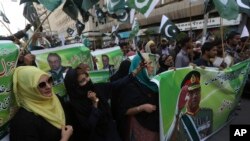Pakistan’s ailing former president on Wednesday said the death sentence given to him by a court in a treason case was based on a “personnel vendetta.”
It was Pervez Musharraf’s first reaction to Tuesday’s court verdict, which the country’s powerful military had already denounced.
Musharraf’s supporters across the country have held small rallies to show support for him since the court found him guilty of imposing an emergency in violation of the constitution and sentenced him to death.
In a video released by his party, Musharraf said “there is no example of such a decision in which neither the defendant nor his lawyer was given permission to say something in his defense.”
He said the court that held his trial in intervals from 2014 to 2019 had rejected his request to record a statement in Dubai, where he has been living since 2016, when he left Pakistan to receive medical treatment.
'No need' to hear case
Musharraf said the court verdict against him was questionable and that the supremacy of rule of law was not maintained.
“I will say that there was no need to hear this case under the constitution. … [T]his case was taken up and heard because of personal vendetta of some people against me,” he said.
Without citing names, he said that those who acted against him “are enjoying high positions and they misuse their office.”
He praised the people and armed forces of Pakistan for standing by him after the court sentenced him to death. He said he would decide his future after consulting with his lawyers and that he expected and hoped that justice would be done.
His lawyers have already said that he will challenge death sentence.
Hours earlier, Pakistani Prime Minister Imran Khan consulted his advisers to decide how to handle the situation arising from the sentencing.
Pakistan and the UAE have no extradition treaty and Emirati authorities are unlikely to arrest Musharraf.
'Never' a traitor
The military earlier said it received the court verdict “with a lot of pain and anguish.” It said that Musharraf, “who has served the country for over 40 years,” fought wars for the defense of the country and “can surely never be a traitor.”
Musharraf seized power in 1999 by ousting the elected government of then-Prime Minister Nawaz Sharif. In 2007 he imposed an emergency and placed several key judges under house arrest in the capital, Islamabad, and elsewhere in Pakistan.
Later, when he was back in office, Sharif accused Musharraf of treason in 2013. The general was formally charged in 2014.
Sharif, ousted by a court in 2017 on corruption charges, is currently receiving treatment in London after being released on bail.




